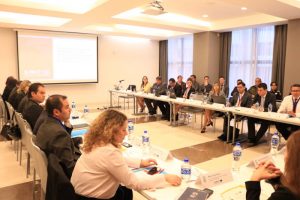
05/04/2018
The latest activities of the EU-funded programme have focussed on information exchange and regional cooperation in relation to the problem
Human trafficking and smuggling have been the focus of the last activities undertaken by EL PAcCTO in Latin America, where the International Labor Organization (OIT) estimates that in 2014 there were up to 400.000 annual victims for the purpose of sexual exploitation alone.
This European Union-funded programme is coordinated by FIIAPP and Expertise France with the support of two partners, the IILLA and the Insituto Camões, to strengthen the fight against organised crime in the region. It seeks to hold meetings to strengthen the capabilities of police, judicial and fiscal institutions in investigating cases of human trafficking and smuggling, as well as to facilitate inter-agency police work between Latin American countries and the EU.
The first workshop within this programme was held in Mexico City to exchange information on the subject. Specialised police officers and prosecutors from the participating countries shared experiences and worked together on specific cases, with the aim of achieving greater police and judicial cooperation between them.

One of the main objectives was to learn about the regulatory reality in situations involving trafficking in human beings in the region, as well as to issue proposals and recommendations to modify this legislation.
The 13 invited countries (Argentina, Bolivia, Brazil, Chile, Colombia, Costa Rica, Ecuador, Guatemala, Mexico, Panama, Paraguay, Peru and Uruguay) requested support from PAcCTO to more effectively fight human trafficking and smuggling.
A second meeting was organised in Paraguay, on strengthening investigation mechanisms and procedures. A European expert met with institutional and operational representatives from the Ministry of the Interior and the Public Prosecutor’s Office to analyse and make recommendations on the subject.
The country has had a law on human trafficking since December 2012, which covers all the aspects of the crime indicated by the United Nations. In Paraguay, the main problem is the recruitment of victims who fit the profile of women under 30 years old belonging to impoverished areas.